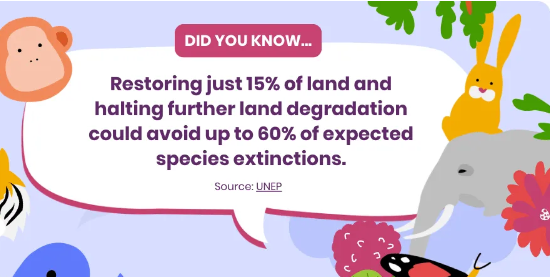Step 2: Protect The Forests
Planting forests is crucial for combating climate change, preserving biodiversity, and maintaining ecological balance. Forests act as carbon sinks, absorbing significant amounts of CO2, which helps mitigate global warming. Reforestation is particularly important as around 70% of deforestation is driven by agricultural expansion, notably for soy (often used for animal feed) and palm oil (used in processed food and cosmetics). By restoring forests, we can reduce the environmental impact of agriculture, protect wildlife habitats, and ensure the sustainability of natural resources.
And great things are happening with reforestation. France has more trees today than it had in 1600, with forests now covering 31% of France, a remarkable transformation largely due to concerted reforestation efforts and improved forest management practices. After centuries of deforestation for agriculture, fuel, and construction, there have been significant reforestation programs. One of France’s newest regional natural parks, the Baronnies Provençales, spreads across 1,800 square kilometres (700 square miles) of the Drôme and Hautes-Alpes. With a mix of pine, oak and beech, fully 79% of the park is covered by forest, and this share is growing.
Here are 3 steps you can take as an individual:
- Avoid Palm Oil. Palm oil has been a key driver of deforestation. Go sustainable or palm oil free. You are most likely to find palm oil in cakes, biscuits, chocolate, bread, shampoo and shower gel.
- Plant Trees. More forests help to protect animals and biodiversity. Scientists have found that we could plant 1 trillion trees without affecting crops and homes.
- Protect the forests. Protecting forests, especially rainforests, is key. This could be indirect support through your choices but also direct support to charities and NGOs.

